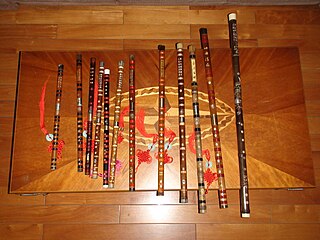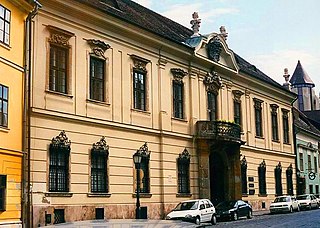Related Research Articles

Music of Malaysia is the generic term for music that has been created in various genres in Malaysia. A great variety of genres in Malaysian music reflects the specific cultural groups within multiethnic Malaysian society: Malay, Chinese, Indian, Dayak, Kadazan-Dusun, Bajau, Orang Asli, Melanau, Kristang and others.

The music of Indonesia its cultural diversity, the local musical creativity, as well as subsequent foreign musical influences that shaped contemporary music maybe scenes of Indonesia. Nearly thousands of Indonesian islands having its own cultural and artistic history and character. This results in hundreds of different forms of music, which often accompanies by dance and theatre.

Music of China refers to the music of the Chinese people, which may be the music of the Han Chinese as well as other ethnic minorities within mainland China. It also includes music produced by people of Chinese origin in some territories outside mainland China using traditional Chinese instruments or in the Chinese language. It covers a highly diverse range of music from the traditional to the modern.

The erhu, is a two-stringed bowed musical instrument, more specifically a spike fiddle, which may also be called a Southern Fiddle, and is sometimes known in the Western world as the Chinese violin or a Chinese two-stringed fiddle.
Gagaku is a type of Japanese classical music that was historically used for imperial court music and dances. Gagaku was developed as court music of the Kyoto Imperial Palace, and its near-current form was established in the Heian period (794-1185) around the 10th century. Today, it is performed by the Board of Ceremonies in the Tokyo Imperial Palace.

The dizi, is a Chinese transverse flute. It is also sometimes known as the di or héngdi, and has varieties including Qudi, Bangdi, and Xindi. It is a major Chinese musical instrument that is widely used in many genres of Chinese folk music, Chinese opera, as well as the modern Chinese orchestra. The dizi is also a popular instrument among the Chinese people as it is simple to make and easy to carry.

The music of Myanmar shares many similarities with other musical styles in the region. Traditional music is melodic, having its own unique form of harmony, often composed with a 4
4 (na-yi-se), a 2
4 (wa-let-se) or a 8
16 time signature. In Burmese, music segments are combined into patterns, and then into verses, making it a multi-level hierarchical system. Various levels are manipulated to create a song. Harmony in Mahagita is known as twe-lone, which is similar to a chord in western music. For example, C is combined with F or G.
The Tafelmusik Baroque Orchestra is a Canadian Baroque orchestra specializing in early music and based in Toronto. They often perform with choir and play period instruments.

Wu Man is a Chinese pipa player and composer. Trained in Pudong-style pipa performance at the Central Conservatory of Music in Beijing, she is known for playing in a broad range of musical styles and introducing the pipa and its Chinese heritage into Western genres. She has performed and recorded extensively with Kronos Quartet and Silk Road Ensemble, and has premiered works by Philip Glass, Lou Harrison, Terry Riley, Bright Sheng, Tan Dun, Zhao Jiping, and Zhou Long, among many others. She has recorded and appeared on over 40 albums, five of which have been nominated for Grammy Awards. In 2013, she was named Instrumentalist of the Year by Musical America, becoming the first performer of a non-Western instrument to receive this award. She also received The United States Artist' Award in 2008.

Budapest is the capital and largest city of Hungary; it has long been an important part of the music of Hungary. Budapest's music history has included the composers Franz Liszt, Ernő Dohnányi, Zoltán Kodály and Béla Bartók and the opera composer Ferenc Erkel.
Mei Han is a Chinese guzheng performer and scholar.
Korphai Ensemble, Korphai or kor phai which literally means a 'bunch of bamboo', is an ensemble of traditional Thai percussion music.
Lian Ensemble is a Persian classical music ensemble based in Los Angeles, California, USA.

Serouj Kradjian is a Grammy-nominated and Juno-winning Armenian-Canadian pianist and composer.
Sinyan Shen was a Singaporean physicist and classical composer.

The Orchid Ensemble is a Canadian musical ensemble formed in 1997 in Vancouver. It is led by Lan Tung from Taiwan on erhu, with Yu-Chen Wang from Taiwan on guzheng and Jonathan Bernard from Canada on various percussion instruments. Former guzheng players include Haiqiong Deng, Mei Han, Geling Jiang, and Bei Bei He.

Founded in 1999, the Ba Ban Chinese Music Society of New York is dedicated to the preservation, creation and presentation of Chinese traditional and contemporary performing arts. Named after an ancient piece of folk music, "Ba Ban" literally means "Eight Beats" which is the structural basis for the grouping of notes in traditional Chinese music. It is based in Queens, New York.

The Shamss Ensemble is a musical group that performs traditional Sufi and classical Iranian music with the Tanbour, Daf, Ney and various other percussion instruments. The group was founded by composer Kaykhosro Pournazeri. His sons Tahmoures and Sohrab are also members of the group.
Music of Canadian Cultures is a wide and diverse accumulation of music from many different individual communities all across Canada. With Canada being vast in size, the country throughout its history has had regional music scenes. The music of Canada has reflected the multi-cultural influences that have shaped the country. First Nations people, the French, the British, the United States and many others nationalities have all made unique contributions to the musical heritage of Canada
Simon Capet is an English conductor and filmmaker. He notably founded the Victoria Philharmonic Choir in 2005 and the Euphonia Music Festival in 2006. A graduate of the Vancouver Film School, his 2000 musical drama film Evirati won him the Telefilm Canada Award for Best Emerging Director of a Short Film at the Vancouver International Film Festival and the award for Best Short Screenplay at the New York International Independent Film and Video Festival.
References
- ↑ "Greeting the new year". Salmon Arm Observer, Feb 1st, 2017
- ↑ "Chinese musicians offer a mixed banquet". Georgia Straight, by Alexander Varty on April 13th, 2006
- 1 2 3 "A Night of Moving Sounds". Vancouver Weekly, June 6, 2013 by Mike Okada
- ↑ "“Autumn Flight” celebrates community in historic Chinatown". Vancouver Observer, Jason Hall Nov 20th, 2014
- ↑ "East meets West, creates absorbing musical idiom". Toronto Star - Toronto, Ont. Geoff Chapman Apr 17, 1994 Page: B.4
- ↑ "The National International Chart". !earshot, June 27, 2006.
- ↑ "Top Albums of 2006". 92.5FM Radio.
- ↑ "Cherry Jam Downtown Concert". Vancouver's Best Places.